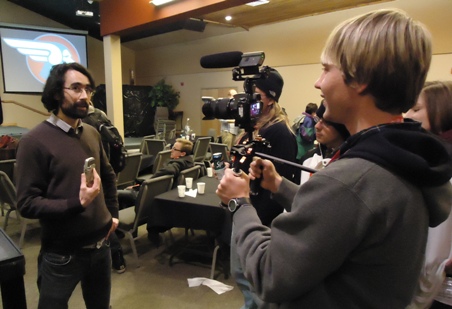At the same time, the production values and soundscape of Upstream Color are incredible, and even the story rather straightforward and in some ways interesting. Yet the dialogue seems to never achieve a level of sophistication beyond the title's style of poetry, which could be either sad or funny -- perhaps that was the intention of the film.
Then we watched Rising From Ashes (Johnstone, 2013), a documentary about the Rwandan bicycle racing team and narrated by Forrest Whitaker, at the Windrider Forum's closing event. The trailer is posted below.
Highlights of the day certainly included student Peter Varburg's mention in the New York Times article on Sister Rose Pacatte published on Saturday. Freedman's article is entitled: "Acting as a Mediator at the Crossroads of Faith and Film," which also includes the Windrider Forum.
Peter Varberg, interviewed by Samuel G. Freedman for the NYT article.
Saturday evening we were super excited to see that Fruitvale and Circles, which I couldn't help but praise earlier in the week, won in their respective categories: U.S. Dramatic Grand Jury Prize, and World Cinema Dramatic Special Jury Award. In a sense, I have become attached to these films. Also super happy to see that Catnip: Egress to Oblivion? won the Audience Award for YouTube shorts.
This week has been more incredible than I could have imagined. I errantly expected to be moved by a couple films and sit through a lot of overly-artistic, under-produced drivel. Instead, I had the time of my life, so many awesome films. I absorbed the entire vibe as best as I know how, from the midnight screening of S-VHS to the political engagement of Citizen Koch and 99%, and character portraits in documentaries and feature films alike. As a first-time attendee, I can't wait to find out if it is this great every year.




